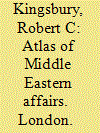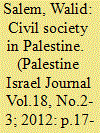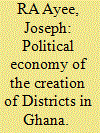| Srl | Item |
| 1 |
ID:
139985


|
|
|
|
|
| Publication |
London, Methuen and co. ltd., 1964.
|
| Description |
vii, 117p.hbk
|
|
|
|
|
|
|
|
|
|
|
|
Copies: C:1/I:0,R:0,Q:0
Circulation
| Accession# | Call# | Current Location | Status | Policy | Location |
| 001785 | 956/KIN 001785 | Main | On Shelf | General | |
|
|
|
|
| 2 |
ID:
126448


|
|
|
|
|
| Publication |
2012.
|
| Summary/Abstract |
It was as a precursor to the establishment of the Palestinian Authority (PA) in May 1994, when the prospect of state-building entered the political horizon, that the concept of "civil society" became part of the research discourse in Palestine. Questions were posed about economic issues, the proposed structure of the national authority and the feasibility of building a democratic state out of an occupied land. Many feared that the new authority would lean toward authoritarianism rather than democracy - and therefore hoped to find in civil society both a balance for the power of the state and a means of redistributing power. They hoped that civil society would indeed turn out to be, in the words of Palestinian academic George Giacaman, "that societal sphere, in which the individual plays the role of a social actor through the society organizations and in relative separation from the state" (Giacaman, 1995, p.108). This article will consider what it means to discuss Palestinian civil society, trace its historical development, and review the challenges it has faced since 2007 after the political division of the West Bank and Gaza.
|
|
|
|
|
|
|
|
|
|
|
|
|
|
|
|
| 3 |
ID:
084365


|
|
|
|
|
| Publication |
2008.
|
| Summary/Abstract |
This article presents an ethnographic analysis of three indigenous leadership types and their formation in contemporary Chiapas. In their interaction with state institutions-and with its policies for political organization and economic development, these cases show the leadership strategies they use to benefit their communities and to help understand local definitions of power. In San Jer nimo Tulij , the area under study, the regional state formation process is the historical framework where local practices and beliefs are shaped and reshaped during daily interactions. This paper shows how some communitarian factions were formed in the context of commercial interactions introduced by development projects brought into the state; these evolved into political divisions that are still recognizable in the context of the low intensity warfare experienced in this region. Therefore, an anthropological-historical perspective is needed to grasp how fighting in or against the Zapatista Army of National Liberation (EZLN) is closely linked to historic local struggles and disputes.
|
|
|
|
|
|
|
|
|
|
|
|
|
|
|
|
| 4 |
ID:
127819


|
|
|
|
|
| Publication |
2013.
|
| Summary/Abstract |
There has been a flurry of publications examining Ghana's decentralization programme since 1988 to date. None has, however, specifically focused on the creation of districts; that is, the political and geographical division of the state into smaller jurisdictions - arguably regarded as one of the key processes of decentralization. In other words, the numerous studies do not fully explain the politics of the creation of districts, which has not only been a recurring phenomenon but also a contentious and sensitive one. This paper aims at filling this lacuna by identifying the actors and discussing their interests, benefits and the tensions arising from the creation of new districts in Ghana. The lessons learnt are also highlighted.
|
|
|
|
|
|
|
|
|
|
|
|
|
|
|
|